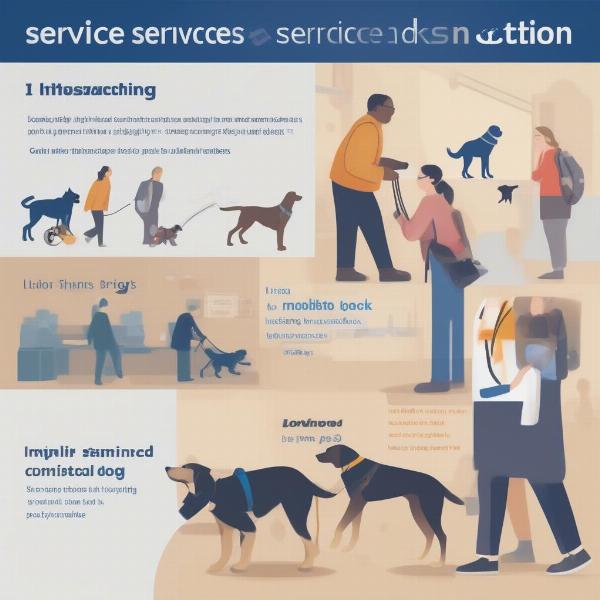The phrase “dog works” can encompass a wide range of activities, from structured tasks like service work and herding to everyday “jobs” like guarding the home or simply being a loving companion. Understanding what “dog works” means to you and your dog is crucial for choosing the right breed, providing appropriate training, and ensuring a fulfilling life for your furry friend. This article delves into the various interpretations of “dog works” and provides valuable insights for dog owners of all experience levels.
Exploring the Diverse World of Dog Works
“Dog works” can refer to traditional working roles, such as police dogs, search and rescue dogs, and guide dogs. These dogs undergo rigorous training to perform specific tasks and assist humans in various capacities. However, “dog works” can also refer to the less formal, yet equally important, roles dogs play in our lives, such as providing companionship, emotional support, and even helping us stay active.
 Service Dogs at Work
Service Dogs at Work
What constitutes “dog works” also varies depending on the breed. Some breeds, like Border Collies, are naturally inclined towards herding and excel in activities that challenge their intelligence and physical abilities. Other breeds, like Golden Retrievers, are known for their gentle nature and make excellent therapy dogs.
Matching Dog Works to Your Dog’s Breed and Personality
Choosing the right “dog works” for your furry companion depends largely on their breed and individual personality. A high-energy breed like a Siberian Husky might thrive in agility training or dog sledding, while a more laid-back breed like a Cavalier King Charles Spaniel might be perfectly content with daily walks and cuddle sessions.
Understanding your dog’s temperament is also essential. A shy or anxious dog might find the pressure of competitive dog sports overwhelming, while a confident and outgoing dog might relish the challenge. Observing your dog’s behavior and preferences can help you identify activities they enjoy and excel in.
Dog Works: Beyond the Traditional
Beyond traditional working roles and breed-specific activities, “dog works” can also include engaging in activities that stimulate your dog’s mind and body. This could be anything from learning new tricks to exploring new environments. Even simple activities like fetch or a game of hide-and-seek can provide valuable mental and physical stimulation.
Remember, “dog works” doesn’t always have to be about structured tasks or formal training. The most important aspect is that the activities are enjoyable for both you and your dog and contribute to their overall well-being.
Conclusion: Finding the Right “Dog Works” for a Fulfilling Life
“Dog works” encompasses a diverse range of activities, from professional service roles to everyday interactions that enrich the lives of both dogs and their owners. By understanding your dog’s breed, personality, and individual needs, you can identify the right “dog works” to ensure a happy, healthy, and fulfilling life for your furry companion.
FAQ
-
What are some examples of traditional dog works? Traditional dog works include roles like police work, search and rescue, guide dog services, herding, and guarding livestock.
-
How can I find the right “dog works” for my dog? Consider your dog’s breed, personality, and energy levels. Observe their behavior and preferences to identify activities they enjoy.
-
Do all dogs need “dog works”? While not all dogs need formal “jobs,” all dogs benefit from mental and physical stimulation. This can be achieved through various activities, from training to playtime.
-
What if my dog doesn’t seem interested in any activities? Experiment with different activities and find something that motivates your dog. Start with short sessions and gradually increase the duration and difficulty as they gain confidence.
-
Can senior dogs participate in “dog works”? Absolutely! Senior dogs can benefit from age-appropriate activities that keep them physically and mentally active.
-
Where can I find more information about dog activities? Consult with your veterinarian, a professional dog trainer, or reputable online resources like ILM Dog.
-
What are some non-traditional “dog works” examples? Non-traditional “dog works” can include activities like learning tricks, playing fetch, going on hikes, or simply being a loving companion.
Related Articles on ILM Dog:
About ILM Dog: ILM Dog is your trusted resource for expert advice on dog care, breeds, health, training, nutrition, grooming, and much more. We are dedicated to providing dog owners with the information and resources they need to ensure their furry companions live long, happy, and healthy lives. From selecting the right breed to addressing behavioral challenges, ILM Dog offers practical guidance and valuable insights for dog lovers of all levels. Contact us at [email protected] or +44 20-3965-8624 for personalized support.